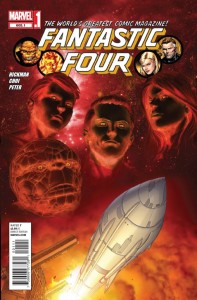 Editor’s Note: It was the world’s strangest accident. While testing a new Web site, our heroes were bombarded by mysterious spoilers from outer space!
Editor’s Note: It was the world’s strangest accident. While testing a new Web site, our heroes were bombarded by mysterious spoilers from outer space!
In a complete and total vacuum, Fantastic Four #605.1 is an interesting little one-and-done Elseworlds-style alternate history of the Fantastic Four, hypothesizing what the team would be like if they’ve been born and raised in Nazi Germany. Which, again, taken on its own is a kind of cool concept (although “Nazi Thing” sounds suspiciously like a fetish German Scheisse porno), but in the real world, it only shows that writer Jonathan Hickman has read Mark Millar’s Red Son and Warren Ellis’s Planetary, and that he also thinks that the character of Reed Richards is a real, real douchebag.
The concept behind the book is simple: the Germans won World War II – we know this because we’re shown that New York City is now New Berlin, and Boston is a concentration camp (really, Hickman? You were born in North Carolina and you’re gonna shit on Boston? Look, we’re sorry about 2004 and 2007, you petty bastard) – and Reed Richards and his buddy Der Furher are planning a space flight to the sun. On this mission, Richards plans to take Aryan SS cadets Susan and Jonathan Sturm, and captive “Jew pilot” Ben Grimm. After a little scheming, a meeting with Viktor Von Doom that ends with some impromptu brain surgery, and the space flight, a plan to seize power ensues.
Sounds like a ripping little yarn, no? And it is, taken on it’s own, but it sounds remarkably similar to Ellis’s The Four from Planetary, which also included at least one power-mad Nazi and the Reed Richards analogue to use his power to take over the world. And the concept of “What would happen if {$superhero} was raised in {$oppressive_regime}?” has been done to death, from Millar’s Red Son to, to a lesser extent, Chris Claremont’s Days of Future Past and Geoff Johns’s more recent Flashpoint. This issue of Fantastic Four is an interesting little extrapolation, but it’s clearly not the most original thing under the sun.
Further, it all just feels rushed. All the other previously-mentioned alternative history books took at least a few issues to spin things out, but this wraps everything up in 20 short pages. And when I say, “everything,” I mean everything: we get the team being assembled, the space flight, Richards seizing power, battling all the other superheroes and eventually destroying the world with the Infinity Gauntlet. And while the story is extremely effective at establishing a menacing tone around megalomaniacal Nazi Reed Richards, it barely shades in story areas that I would have liked to have known. Things like: how does the guy who arranged the murder of Hitler wind up seizing power as opposed to dying in a hail of bullets? And where did he get the Infinity Gauntlet? Was it in Hitler’s private collection? And if it was, why was Hitler throwing money and scientists at the whole space mission when he could have just said, “Be in space now. And grow me back that missing testicle”?
If there is one thing that Hickman has made utterly clear in recent months, it is that he hates and fears the character of Reed Richards. Between the army of Reeds in this core title and FF that are hell-bent on world domination, and Reed and The City threatening the world in The Ultimates, it seems that there is a constant and conscious decision to throw Reed into the full Mad Scientist mode. Which is fine, and frankly a reasonable decision for a character whose introduction in 1961 revolved completely around stealing a spaceship and horribly disfiguring her crew; taken at the correct angle, Reed Richards is a bigger and more reckless monster than Henry Jekyll, who after all only fucked up his own shit. But after a couple of years and two books, seeing Nazi Reed here just made me mutter, “I get it, Hickman; Reed Richards is a cock. What else you got?”
The art by Mike Choi is serviceable. His people look like regular people as opposed to your standard superhero Adonis / breast life support systems you sometimes see in comics, and while the visuals are realistic-looking, his pencil line is a bit loose, giving everything more of a sketch look than you often see in mainstream books. Frankly, I was just as impressed with the coloring work by Cris Peter; he uses a muted palette that gives everything a sepia look appropriate to a book taking place, based on how hearty and hale Hitler looks, back in probably 1961 as in the original continuity. The combination gives the book a subtly unique look that I enjoyed.
This is an interesting little alternative history book that, unfortunately, did more to remind me of similar, and frankly better, stories of the same ilk. And as a Point One issue, which Marvel swears up and down should be used as an entry point into the title for new readers, well, I don’t really see how an alternative history about really loathsome Nazis would lead people to add the book to their pulls. On the whole though, if you’re looking for a Hickman alternative history this week? Leave this one and go for the vastly superior The Manhattan Projects #3. It’s more interesting, and it won’t give you the inappropriate feelings associated with picturing “Nazi Thing.”
 Podcast RSS Feed
Podcast RSS Feed iTunes
iTunes Google Play
Google Play Stitcher
Stitcher TuneIn Radio
TuneIn Radio Android
Android Miro Media Player
Miro Media Player Comics Podcast Network
Comics Podcast Network